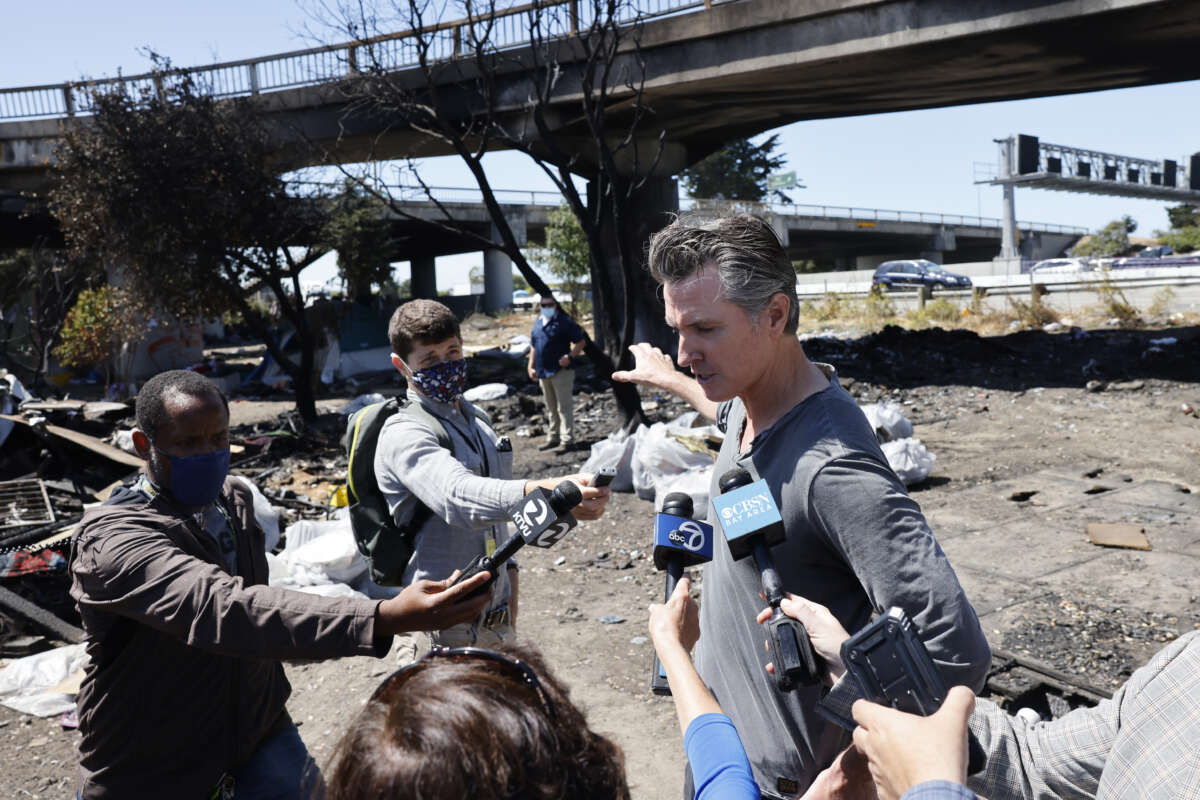After personally participating in the forced displacement of homeless people in a Los Angeles encampment, Democratic California Gov. Gavin Newsom on Thursday threatened to withhold funding from counties that don’t sufficiently crack down on the unhoused.
Buoyed by the right-wing U.S. Supreme Court’s recent City of Grants Pass, Oregon v. Johnson ruling — which was welcomed by Newsom and other Democratic leaders like San Francisco Mayor London Breed who filed amicus briefs in the case — the governor issued an executive order last month directing officials to clear out homeless encampments, which have proliferated amid rampant economic inequality and stratospheric housing prices in the nation’s most populous state.
After taking part in a Thursday sweep of an encampment in Mission Hills in L.A.’s San Fernando Valley, Newsom declared: “I want to see results… If we don’t see demonstrable results, I’ll start to redirect money.”
Newsom praised leaders like Breed and Democratic Los Angeles Mayor Karen Bass for reducing the number of people sleeping on their cities’ streets and directed his ire mostly toward county governments.
“This is a sincerely held belief that we need local government to step up,” the governor added. “This is a crisis. Act like it.”
Newsom has made — and followed through on — similar promises in the past. Last month, his office redirected a $10 million grant for San Diego County to buy so-called “tiny homes” for the unhoused because officials there “could not move with the urgency the housing and homelessness crisis demands.”
University of California, Los Angeles sociology professor and homelessness expert Chris Herring told The Guardian following Newsom’s executive order that the directive is “giving a green light to a harsher approach” to tackling California’s unhoused crisis, which critics say criminalizes people for being poor.
“It sends a clear message to municipalities that even if you do not have shelter available, you can go through with this,” Herring said. “The law now allows cities and counties to cite and incarcerate individuals for sleeping outside.”
In San Francisco — where Breed, a moderate Democrat, is up for reelection in November — police have begun aggressively sweeping homeless encampments. Unhoused residents are given a choice between capacity-challenged shelters, where they’re often separated from family and pets and subjected to dangerous conditions, or jail.
This, in a city that’s short several thousand shelter beds.
Some San Franciscans who initially supported police sweeps have recoiled when faced with what one small business owner called the “inhumane” reality of the policy.
As The San Francisco Standard’s Christin Evans reported this week:
One woman described to me having her wallet—containing her ID, debit, and EBT cards—pulled from her hand as a police officer proceeded to “taunt” her with possible arrest. Why? Because she declined to accept a bed at a crowded shelter where she would be separated from her husband. A day later, police officers arrived at the site where the couple had relocated a few blocks away and issued a citation for illegal lodging. Now, the couple have a court date to address a “crime” that is punishable by a $1,000 fine and up to a year in jail.
Experts from across the political spectrum have asserted that homeless sweeps don’t work. A study of Los Angeles’ homeless population published in July by the Rand Corporation, a Santa Monica-based think tank, found that cleared encampments generally return after a month or two.
“We found continuing evidence that local encampment cleanup activities don’t appear to lead to a persistent reduction in the number of unsheltered residents in the area,” study co-author Jason Ward said during a video conference, according to an article published last week by The American Prospect. “They just tend to move them around and the numbers tend to return in our relatively small area to previous trends pretty quickly.”
“Homelessness is dangerous, humiliating, and traumatic. Nobody needs to be reminded of these truths,” article author Nicholas Slayton wrote. “If Gavin Newson wants to fix the problem, he could work to get more housing built, especially affordable units—by, for instance, signing rather than vetoing a social housing bill.”
“But if he wants to sweep the problem under the rug so as to pretend like he’s doing something useful while actually making the problem worse, he could continue on his present course,” he added.
Angry, shocked, overwhelmed? Take action: Support independent media.
We’ve borne witness to a chaotic first few months in Trump’s presidency.
Over the last months, each executive order has delivered shock and bewilderment — a core part of a strategy to make the right-wing turn feel inevitable and overwhelming. But, as organizer Sandra Avalos implored us to remember in Truthout last November, “Together, we are more powerful than Trump.”
Indeed, the Trump administration is pushing through executive orders, but — as we’ve reported at Truthout — many are in legal limbo and face court challenges from unions and civil rights groups. Efforts to quash anti-racist teaching and DEI programs are stalled by education faculty, staff, and students refusing to comply. And communities across the country are coming together to raise the alarm on ICE raids, inform neighbors of their civil rights, and protect each other in moving shows of solidarity.
It will be a long fight ahead. And as nonprofit movement media, Truthout plans to be there documenting and uplifting resistance.
As we undertake this life-sustaining work, we appeal for your support. We have 7 days left in our fundraiser: Please, if you find value in what we do, join our community of sustainers by making a monthly or one-time gift.


 (@KtownforAll)
(@KtownforAll)